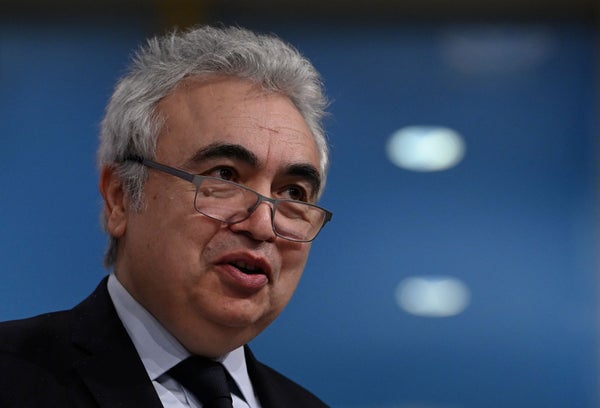CLIMATEWIRE | Countries need to double their energy efficiency gains to achieve the emissions reductions required to follow the 2015 Paris climate agreement and to avoid the worst impacts from global warming, according to a report Wednesday by the International Energy Agency.
The IEA analysis shows average gains in energy efficiency must reach 4 percent per year between now and 2030 to limit global warming to 1.5 degrees Celsius above preindustrial levels. The report, released a day before the start of the United Nations climate summit in Dubai, United Arab Emirates, notes that many developed countries have significantly brought down their energy use in recent years and urges more rapid action.
“The findings of this report are a stark warning to the leaders gathering shortly at the COP28 climate conference in Dubai that they all need to commit to stronger action on efficiency and to deliver it,” said IEA Executive Director Fatih Birol in a statement.
On supporting science journalism
If you're enjoying this article, consider supporting our award-winning journalism by subscribing. By purchasing a subscription you are helping to ensure the future of impactful stories about the discoveries and ideas shaping our world today.
The largest gap in improving efficiency comes from developing countries that are using more energy as their standard of living catches up with that of wealthier nations. IEA’s status quo scenario shows global energy demand growing 2.3 percent per year as the world economy grows 3 percent annually.
But the energy group’s net-zero scenario wherein all households worldwide can have easy access to electricity by 2030 requires “an absolute decoupling of economic growth from energy demand.” That means countries must accomplish 3 percent economic growth while reducing energy demand by 1 percent a year.
Doubling the pace of energy efficiency gains is one of the five key climate action items that IEA is laying out for world leaders at COP28 that would put nations on a path to net-zero emissions by 2030.
Other targets include tripling global renewable energy capacity, slashing methane emissions from fossil fuels by 75 percent, boosting clean energy investment in developing nations and ceasing to approve new coal-fired power plants that do not capture their carbon emissions.
Meeting the IEA target for energy efficiency by 2030 would cut over 7 billion tons of global emissions annually — or 20 percent of the current total carbon pollution every year, according to the report. That’s roughly the amount of emissions from the global transportation sector.
Achieving the energy efficiency goal would also create 4.5 million jobs across the globe and reduce home energy bills by a third in developed countries, according to IEA’s estimates. The economic benefits will materialize as more buildings get retrofitted with heat pumps and more households buy cleaner electric vehicles, the report says.
“An electric vehicle or heat pump not only shifts energy use to electricity that is increasingly coming from clean energy sources but also uses much less final energy than a conventional car or gas boiler to do the same job,” the report says.
Many Western economies have made strides in reducing energy use since early 2022 partly due to a spike in oil prices after Russia’s invasion of Ukraine, IEA said. Nearly one in every five cars sold globally is an electric vehicle, and the growth in heat pump sales outpaces that of gas boilers in many markets.
In the decade leading up to 2022, China reduced its energy intensity — the amount of energy needed for the same amount of economic output — by 26 percent, one of the largest gains among nations, according to IEA.
But the progress slowed in 2023 to a 1.3 percent gain in energy efficiency as record heat waves fueled “a vicious cycle of higher electricity use and carbon emissions” from increased need for air conditioning, the report says.
In parts of the U.S. and in the Middle East, air conditioning accounts for more than 70 percent of peak electricity demand from homes, IEA reports. China’s economic rebound from years of pandemic lockdown also fueled its oil and gas consumption, contributing to sluggish pace in efficiency gains.
This story also appears in Energywire.
Reprinted from E&E News with permission from POLITICO, LLC. Copyright 2023. E&E News provides essential news for energy and environment professionals.
